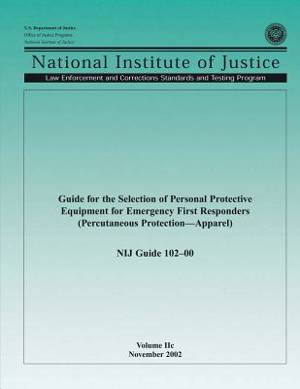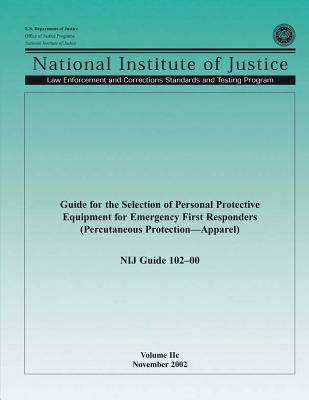
- Afhalen na 1 uur in een winkel met voorraad
- Gratis thuislevering in België vanaf € 30
- Ruim aanbod met 7 miljoen producten
- Afhalen na 1 uur in een winkel met voorraad
- Gratis thuislevering in België vanaf € 30
- Ruim aanbod met 7 miljoen producten
Zoeken
Guide for the Selection of Personal Protective Equipment for Emergency First Responders (Percutaneous Protection-Apparel)
Office of Justice Programs, National Institute of Justice, U S Department of Justice
Paperback | Engels
€ 39,95
+ 79 punten
Omschrijving
The National Institute of Justice is the focal point for providing support to State and local law enforcement agencies in the development of counterterrorism technology and standards, including technology needs for chemical and biological defense. In recognizing the needs of State and local emergency first responders, the Office of Law Enforcement Standards (OLES) at the National Institute of Standards and Technology (NIST), supported by the National Institute of Justice, the Technical Support Working Group (TSWG), the U.S. Army Soldier and Biological Chemical Command, and the Interagency Board for Equipment Standardization and Interoperability (IAB), is developing chemical and biological defense equipment guides. The guides will focus on chemical and biological equipment in areas of detection, personal protection, decontamination, and communication. This document focuses specifically on assisting the emergency first responder community in the evaluation and purchase of personal protective equipment. The long range plans are to: (1) subject existing personal protective equipment to laboratory testing and evaluation against a specified protocol, and (2) conduct research leading to the development of multiple series of documents, including national standards, user guides, and technical reports. It is anticipated that the testing, evaluation, and research processes will take several years to complete; therefore, the National Institute of Justice has developed this initial guide for the emergency first responder community in order to facilitate their evaluation and purchase of personal protective equipment. In conjunction with this program, additional guides, as well as other documents, are being issued in the areas of chemical agent and toxic industrial material detection equipment, biological agent detection equipment, decontamination equipment, and communication equipment. This Volume, IIc, of the Guide for the Selection of Personal Protective Equipment for Emergency First Responders, which focuses on percutaneous (skin) protection other than garments-herein referred to as apparel (e.g., hoods, labcoats, and gloves). It contains the information data sheets that were used to support the personal protective equipment evaluation detailed in Volume I. The compilation of data in Volume IIc is the result of the merger of several data acquisition methods used independently by NIST and TSWG.
Specificaties
Betrokkenen
- Auteur(s):
- Uitgeverij:
Inhoud
- Aantal bladzijden:
- 222
- Taal:
- Engels
Eigenschappen
- Productcode (EAN):
- 9781494214265
- Verschijningsdatum:
- 19/11/2013
- Uitvoering:
- Paperback
- Formaat:
- Trade paperback (VS)
- Afmetingen:
- 216 mm x 280 mm
- Gewicht:
- 526 g

Alleen bij Standaard Boekhandel
+ 79 punten op je klantenkaart van Standaard Boekhandel
Beoordelingen
We publiceren alleen reviews die voldoen aan de voorwaarden voor reviews. Bekijk onze voorwaarden voor reviews.











